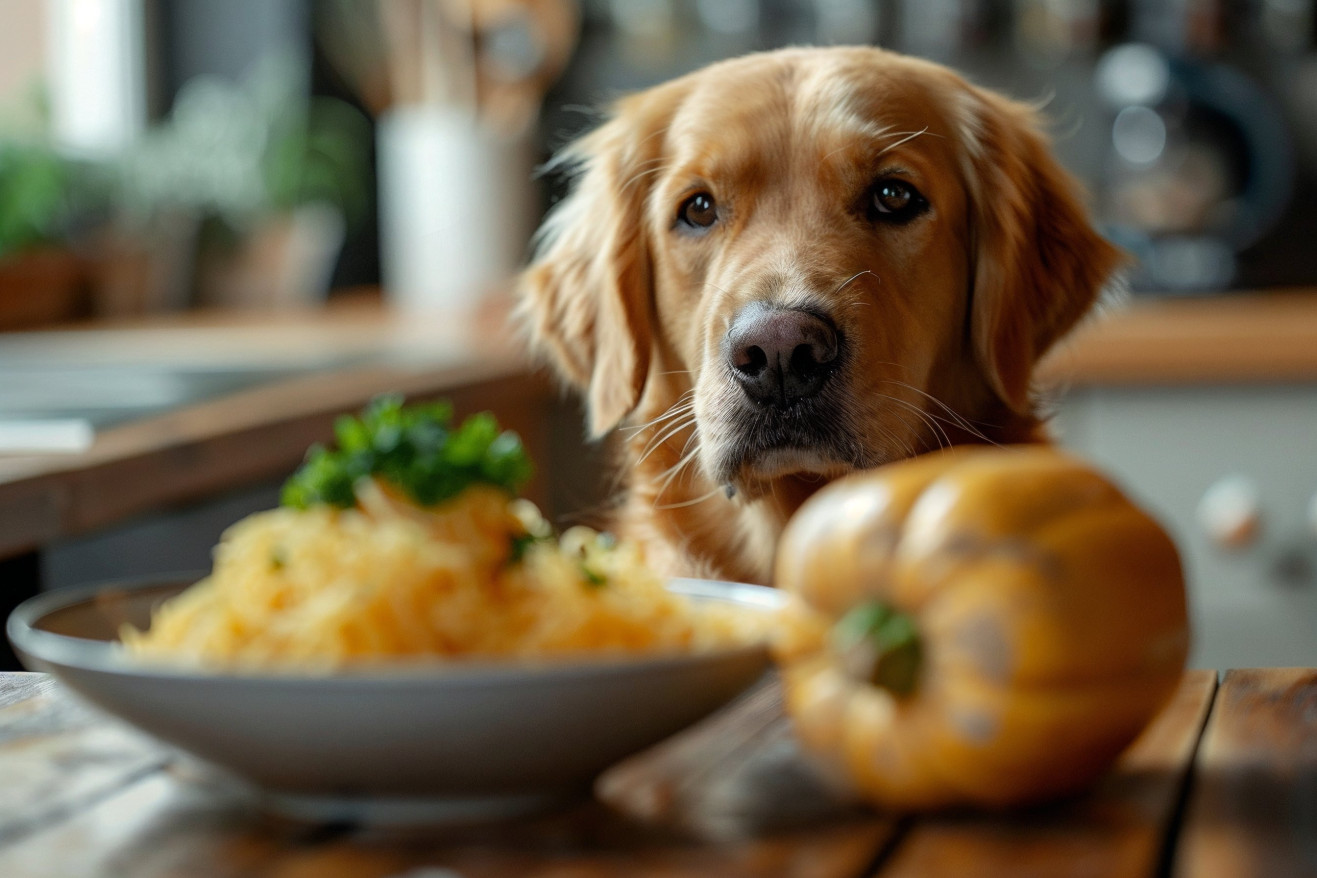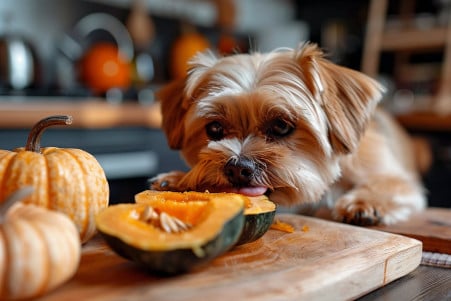Can Dogs Eat Spaghetti Squash? A Vet’s Nutritional Guide
1 March 2024 • Updated 29 February 2024

Spaghetti squash is a popular food in the fall, but can you share this tasty treat with your dog? The good news is that dogs can eat spaghetti squash in moderation. Make sure to cook it and serve it without any additional spices or seasoning.
However, you should avoid the seeds and skin to prevent any potential choking hazards or digestive upset. Always talk to your vet before adding new foods to your dog’s diet.
This article will take a closer look at veterinary information and nutritional data to find out what it really means to give spaghetti squash to your dog. This will include information from a variety of animal nutrition science studies to find out the nutritional value, potential downsides, and serving sizes for dogs when it comes to eating spaghetti squash.
This way, you can feel confident that you’re making the best choices about responsibly adding this squash to your furry friend’s diet.
Can dogs eat spaghetti squash?
Nutritional Facts and Health Benefits of Spaghetti Squash for Dogs
Spaghetti squash is considered a nutritional powerhouse for dogs. According to Rover.com, this superfood is loaded with vitamin A, vitamin C, fiber, and potassium, all of which are important for a dog’s health, including their vision, immune system, and muscles. Beta-carotene and fiber are also important for gut health and regular bowel movements, according to Bone Appetreat.
Spaghetti squash is also a source of antioxidants and omega-3 fatty acids, which are important for a healthy immune system, eye health, and digestion. In addition, these nutrients help to reduce inflammation and support heart and kidney health.
It’s important to feed your dog spaghetti squash in moderation. As a general rule, it should make up no more than 10% of your dog’s meal and should be used as a supplement to their regular diet to add some variety and extra nutrition.
Feeding your dog spaghetti squash in the right amounts will help ensure that they get all of these benefits without experiencing any digestive issues. While spaghetti squash can help with a variety of health concerns, it’s important to make sure that you’re introducing it to your dog’s diet slowly and in moderation to make sure that they get the most out of it in terms of their health and nutrition.
How to Prepare and Serve Spaghetti Squash Safely
If you want to feed your dog spaghetti squash, it’s important to make sure it’s prepared safely. According to DogTime, cooked spaghetti squash is safe for dogs, but you should remove the skin and seeds, which can cause choking or digestive problems.
Cook the squash by steaming or baking it until it’s soft, then scoop out the flesh, making sure it’s unseasoned and free of spices, garlic, onion, or salt, which can all be harmful to dogs.
Spoiled Hounds recommends using spaghetti squash as a topping or mixing it into homemade dog food. This can help ensure your dog gets the benefits of the vegetable. For example, a homemade sauce made from pureed sweet potatoes and water mixed with plain cooked ground meat pairs well with spaghetti squash.
When you first start feeding your dog spaghetti squash, do so in small amounts so you can watch for any negative side effects. According to Dr. Erica from JustAnswer, spaghetti squash should be used as a supplement, not a main food source, and should make up no more than 10–15% of a dog’s daily calories.
By slowly introducing spaghetti squash, you can help ensure a smooth transition and see how well your dog tolerates this nutritious vegetable.
Nutritional Needs for Dogs
All animals, including dogs, need a certain combination of nutrients to be healthy. According to VCA Animal Hospitals, dogs need to eat proteins, fats, carbohydrates, vitamins, minerals, and water. Proteins are needed for tissue repair and muscle growth, fats provide energy and help with cell structure, and carbohydrates provide energy and fiber. Vitamins and minerals are needed for a variety of functions, including bone health and metabolism.
Vegetables, like spaghetti squash, help fulfill these nutritional needs by providing vitamins and fiber and by helping to hydrate the dog, says PetMD. That said, they should be used as a supplement to a dog’s diet, not as a main source of nutrition.
As the Merck Veterinary Manual explains, the AAFCO guidelines require that dog foods meet certain nutrient profiles to make sure that dogs are getting the nutrition that they need. It’s also important to remember that a dog’s nutritional needs will change based on their life stage, lifestyle, and even breed. A puppy’s nutritional needs will be very different from a senior dog’s.
That said, adding spaghetti squash to a dog’s diet in a way that meets these guidelines and takes life stage into account can help provide extra nutrients that will help support their health.
How Dogs Digest Vegetables
The dog digestive system is a wonder of nature, and it has evolved to be able to break down many different types of foods, including vegetables.
Although the diet of dogs’ wild ancestors was largely meat-based, a Nature study, ‘The genomic signature of dog domestication,’ has shown that domestic dogs have evolved to be able to digest starches.
This means that dogs have also evolved to be able to digest fibrous vegetables like spaghetti squash. As Dogs Naturally Magazine explains, dogs can get the hydration and nutrients they need from vegetables, so they can be a great addition to a dog’s diet.
That said, there are differences in the way that different breeds and sizes of dogs digest certain fibers, as a study published in PMC notes. For example, larger dogs have larger colons, which means that they can break down fiber more effectively and absorb water and electrolytes.
This is important to keep in mind when you’re thinking about adding new foods like spaghetti squash to your dog’s diet. While spaghetti squash isn’t a dog food staple, it can be a healthy addition to a dog’s diet if it’s prepared and served correctly.
Because dogs have evolved from being strict carnivores to omnivores, it’s also important to remember that each individual dog may have a different reaction to different foods. By paying attention to how your dog responds to spaghetti squash, you can make sure that this nutritious food is a safe and hydrating addition to their diet.
How to Deal With Dog Food Allergies and Sensitivities
Although spaghetti squash is not a common allergen, it’s still important for dog owners to know the most common food allergens that can impact dogs. According to a study in the journal PLOS ONE, beef, dairy products, chicken, and wheat are the most common food allergens that cause canine cutaneous adverse food reactions (CAFRs). Spaghetti squash is not on this list and is generally considered safe for dogs in terms of allergenic potential.
The Clinical Nutrition Service at Cummings School of Veterinary Medicine notes that symptoms of food allergies or sensitivities in dogs can include itchy skin, ear infections, vomiting, and diarrhea. If your dog experiences any of these symptoms after eating spaghetti squash, it could be a sign of a food sensitivity or allergy.
Vets note that an elimination diet is the “gold standard” for diagnosing food allergies or sensitivities. This diet involves removing the suspected allergen from the dog’s diet to see if the symptoms go away, and then reintroducing the food to confirm the allergy.
To manage food sensitivities when introducing new foods like spaghetti squash, you should feed your dog a small amount and monitor them for any signs of a reaction. The Clinical Nutrition Team at Tufts University’s Cummings School of Veterinary Medicine points out that there is no simple test for food allergies, so monitoring is key.
If your dog does have a reaction, you should contact your vet to determine the next steps. With a careful and watchful approach, you can safely add spaghetti squash to your dog’s diet without any issues.
Final Thoughts on Feeding Your Dog Spaghetti Squash
As shown, spaghetti squash can be a healthy and safe addition to your dog’s diet if it’s prepared properly and given in moderation. Its nutrient-dense combination of vitamins, fiber, and omega-3 fatty acids can help with everything from digestive health to vision and immune support. That said, it’s important to remember that portion sizes matter and to make sure the squash is prepared simply and without any harmful extras.
Always talk to your vet before adding spaghetti squash or any new food to your dog’s diet, as this is the most important consideration. Your vet can help you make decisions based on your dog’s specific health and nutritional needs. It’s up to you to make sure you’re making the best choices for your pets’ diets.
Because of its nutritional value, you can use spaghetti squash as an occasional treat to add some excitement to your dog’s regular meals. Think of it as a supplement rather than a staple, and you can use it to add some extra nutrition to your dog’s diet.


